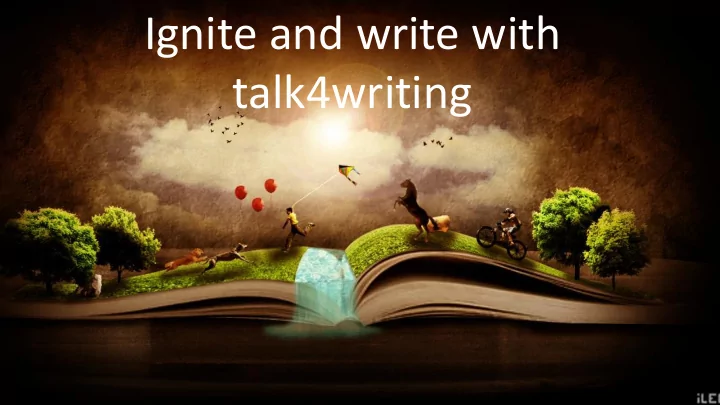

Ignite and write with talk4writing
Aims • To share key principals of talk4writing. • To participate in practical activities that could be used in a talk4writing learning journey. • To consider how talk for writing can be used as an approach in the wider curriculum.
The importance of reading “ The most proficient writers in any class are always readers. It is constant and avid reading that helps children build up a store of patterns and ideas. These become embedded within their imaginative and linguistic competence, to be drawn upon when writing. Ask any author for advice about becoming a writer and they always say the same thing: ‘ Read, read, read. ’ The reading makes the writer.” Pie Corbett
Pie Corbett reading spine
Which texts work really well in your year group and why? Do any of them appear on this list? How are cross curricular links made?
The three key skills to story making – Imitation, innovation, invention Stage 1 - Imitation The ability to learn stories so that the child has a bank of tales / stories that they know by heart.
Stage 2 – Innovation The ability to adapt a well-known story in order to create a new story.
Stage 3 - The invention/independent application stage This is the ability to draw upon the full range of stories, and one’s life to create something new. There may well be elements from different tales as well as totally new ideas.
Stage 2 - innovation • Stage 1 – Imitation Make substitutions to characters Stage 3 – invention • Story mapping / objects events; make additions Experiment and build up a • Vocabulary exploration to the story – more dialogue, range of different strategies • Whole class reading add a new character; change the to encourage the invention of opportunities viewpoint the story is written stories. • • Dramatization from. Reuse a familiar plot • Grammar opportunities pattern. • • Address any issues that were Retell in a new setting • Written retell – mark for highlighted in their written retell video clips or stills • • presentation, Grammar teaching opportunities Use props or story boxes • punctuation, spelling. – what do you want them to Links to topics • achieve in their next piece? Music • • Use the writing indicators to An image to inspire support and inform planning.
Stage 1 - Imitation
Stage 2 - Innovation
Stage 3 - Invention
A whistle stop tour of a story telling unit Year 1 - What is in the story Stage 1 imitate box? Can we predict what might happen in this story? GD learners make links between previous stories they have read – problem, solution etc.
Suggested actions for the key connectives During the imitation stage children should be encouraged to retell stories using actions. These actions will then support when planning their own stories. Key adverbials and conjunctions have an accompanying action which support children with embedding the vocabulary which can they be applied in context across the curriculum.
Story map and oral retell
Reading skills – Vocabulary Word association
Reading skills – Vocabulary Word association
Reading skills – Vocabulary Vocabulary mat
Reading skills – retrieval True or false
Reading skills – retrieval What was the question?
Reading skills – Sequencing
Model text will be your key resource for teaching writing skills: • Punctuation activities • Exploring vocabulary • Past and present tense verbs • Cloze procedure • Sorting sentence types
Children retell the story ry in in writing
Stage 2 - innovate • Change class map • Retell new version • Shared and guided writing modeling • Polishing pens to edit • Daily grammar and spelling focuses
Stage 2 – innovate - how could we innovate this story?
Stage 3 – invent • Increase in independence • Apply to learning in the wider curriculum • Use video clips/ image to inspire http://www.pobble365.com/the- wandering-knight/ https://www.onceuponapicture.co.uk/ https://www.literacyshed.com/home.ht ml
Using story mapping across the curriculum
Questions and thoughts moving forward? l.mcginty@romero.coventry.sch.uk
Christmas Writing Competition More details coming soon!
Recommend
More recommend